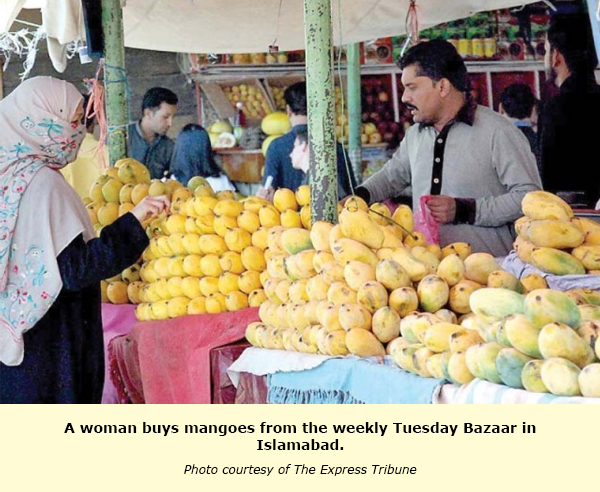Islamabad has seen an increase in the sales of mangoes, the proverbial ‘King of Fruits’.
The fruit is also highly popular among the city’s large expat community, as staffers from various diplomatic missions and international agencies can be seen purchasing fresh mangoes at various popular sales points.

The more popular varieties of mangoes include dasehri, chaunsa, sindhri, fajri, desi, almas, and the famous anwar ratol.
While the king of fruits can look very appealing in markets big and small and even pushcart displays, those fond of the fruit should take care while shopping. Unscrupulous mango vendors are known to use dangerous chemicals to artificially expedite the ripening of the fruit with chemicals that are harmful to human health. The chemicals can ripen a mango in just four to six hours and give it a bright and attractive colour.
Pir Mehr Ali Shah Arid Agriculture University Horticulture Department Chairperson Dr Ishfaq Ahmed Hafiz said that carbide, ethereal 38, and other chemicals are used quickly ripen mangoes, but due to this the fruit does not develop properly and too much use of such chemicals can cause problems for the human body. He said calcium carbide is also used to ripen fruits and vegetables, which is highly dangerous.
He told Express: “The chemical is cheap and only takes four hours to ripen a mango, but this strong chemical also produces ethanol gas when it comes in contact with moisture, which affects the human nervous system.”
Shoppers Khalid Malik, Waqas Riaz, Rashid Butt urged the government to ban the use of such chemicals on mangoes. They complained about people’s indulgence in dishonesty in every business and also said that it is the responsibility of government market committees to ensure that the sale and use of such chemicals on food items is banned.
Calcium carbide (CaC2) contains traces of heavy metals arsenic and phosphorus, both of which can prove fatal for human beings. CaC2 is a known carcinogen – an agent having the ability to alter human cells into cancerous cells.
Though this chemical is banned in many countries, it is being freely used across the country to ripen fruits such as mangoes, watermelons, bananas.
The easy availability is due to its use in welding. CaC2 is dipped in water to react with H2O to produce acetylene or C2H2 which is an inflammable gas.
One of the main reasons to practice this process is to reduce the wastage of highly perishable fruit.
Mango, if taken ripe from tree, will rot in days. Owing to short shelf life traders buy raw mango from farms for shipment to wholesale and then on to retail market. Fruit is ripened at a later stage to cut wastage. The best precaution is to wash the fruit thoroughly to washout carbide content.
